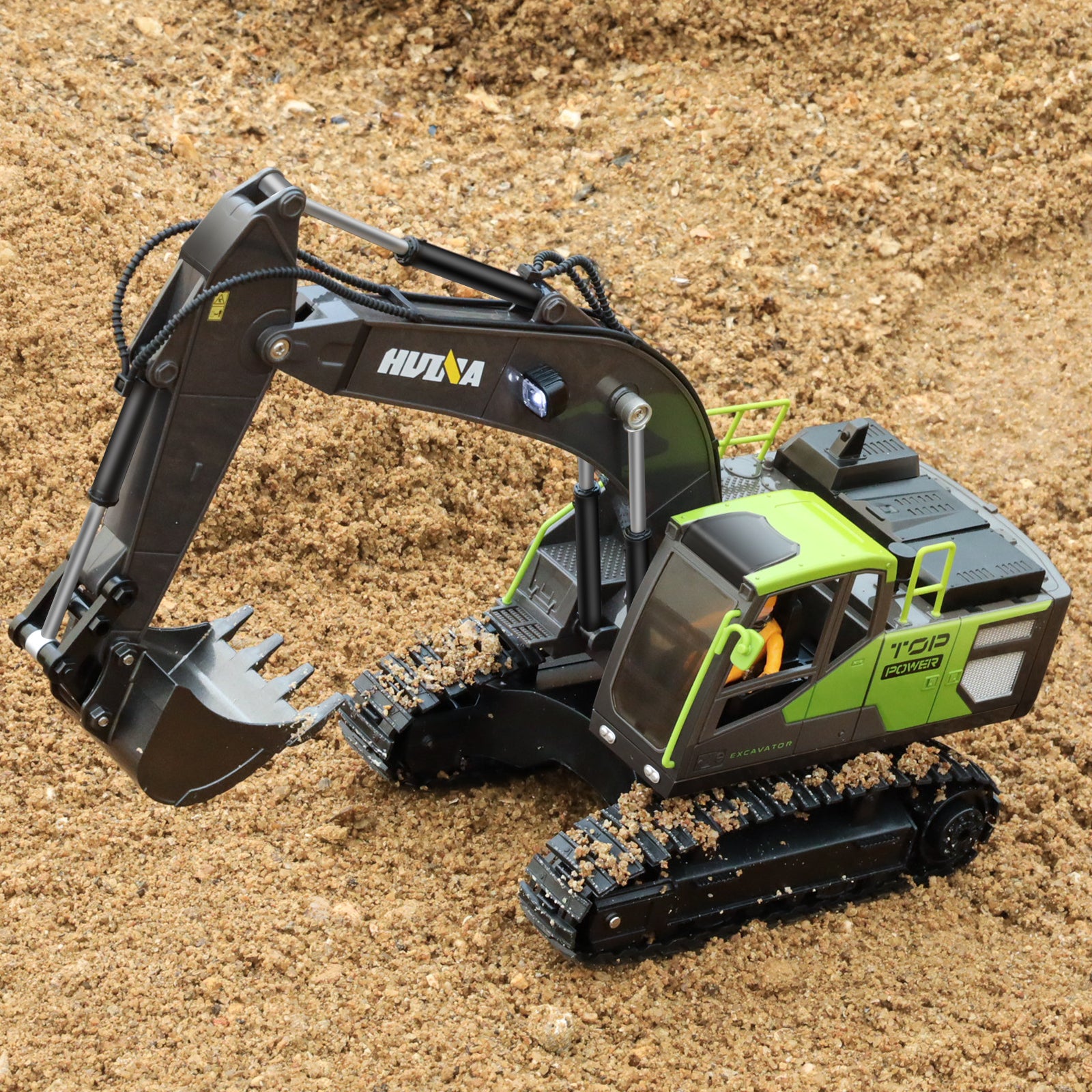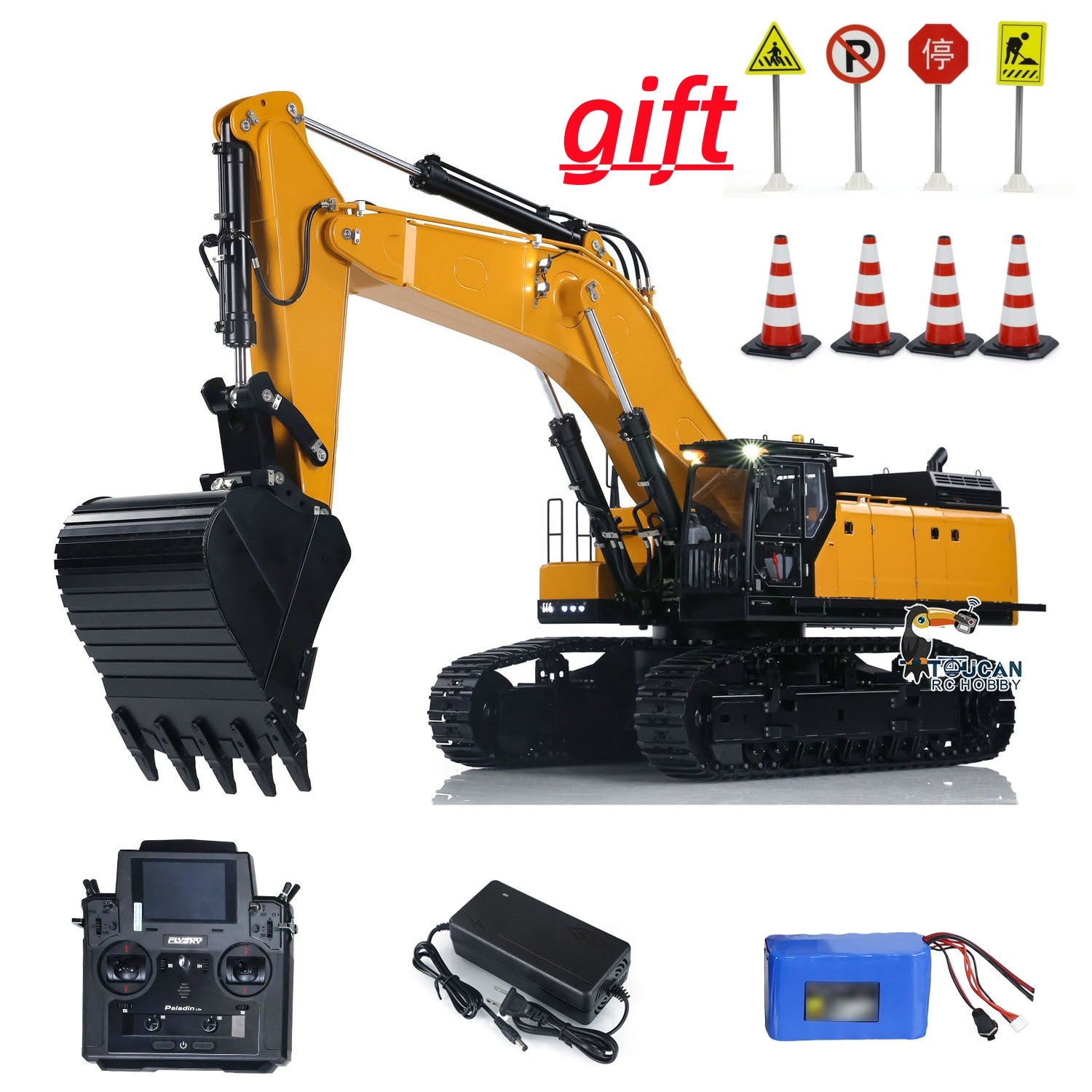Why the Double E Volvo rc excavator Stands Out in Excavation and Demolition Projects
Discover the Significance of Excavator in Modern Building Projects
Excavators are essential devices in contemporary building tasks. Their flexibility allows them to do a broad array of tasks, from digging and grading to demolition and website preparation. Advanced features, such as hydraulic accessories and general practitioners, enhance their capacities and effectiveness on task sites. As the industry progresses, the value of excavators grows much more. Comprehending their role can reveal understandings right into the future of building and construction techniques. What lies ahead for these devices?
The Versatility of Excavators in Various Projects
Although excavators are typically related to massive building and construction projects, their versatility allows them to be utilized in a wide variety of applications, from property landscaping to utility upkeep. In city setups, excavators can browse tight rooms to dig foundations for homes or mount drain systems. Their capability to carry out delicate jobs makes them ideal for landscape design projects, where they can dig deep into for fish ponds or plant trees. Furthermore, excavators play a crucial duty in utility upkeep, efficiently digging trenches for pipelines or cable televisions without interfering with bordering areas. In agricultural applications, they aid in land cleaning and dirt prep work. Moreover, their versatility enables them to be geared up with numerous accessories, boosting their functionality across various tasks. This diverse nature of excavators not only enhances numerous building processes however also demonstrates their indispensable function in modern framework development and upkeep.
Key Features and Kinds Of Excavators
The discussion on vital attributes and kinds of excavators highlights the important characteristics that make these equipments invaluable in construction. Numerous excavator kinds, each created for specific tasks, demonstrate their versatility and performance throughout different applications. rc excavator. Recognizing these classifications and attributes is vital for maximizing their use in modern-day construction jobs
Excavator Enters Summary
Excavators play a critical duty in modern-day construction, providing adaptability and effectiveness throughout different jobs. These hefty machinery systems come in numerous kinds, each tailored for particular applications. One of the most common types consist of spider excavators, known for their stability on irregular terrain, and rolled excavators, which supply greater wheelchair on paved surface areas. Mini excavators are favored for limited spaces and small projects, while long-reach excavators are created for deep digging. Furthermore, there are customized excavators, such as hydraulic excavators, which enhance power and precision. Each kind features one-of-a-kind capabilities, making them vital for jobs ranging from excavating and grading to demolition and material handling. Understanding these variants permits construction experts to pick the appropriate excavator for their project requires.
Trick Includes Explained
Understanding the essential attributes of excavators improves their effective application in building and construction jobs. Excavators are characterized by their powerful hydraulic systems, which supply the essential force for excavating, training, and moving materials. Their expressed arms permit a variety of movement, promoting precise operations in restricted rooms. In addition, the variety of add-ons, such as pails, grapples, and augers, broadens their versatility to satisfy various task demands. The dimension and weight of excavators additionally contribute to their stability and maneuverability on various terrains. Innovations in technology have led to the combination of GPS and automation, enhancing precision and efficiency in excavation tasks. These features jointly position excavators as indispensable devices in modern-day building and construction.
Applications in Building and construction
Changing building and construction sites, excavators play an essential function across various applications, ranging from residential structure projects to massive infrastructure advancements. These versatile makers are outfitted for jobs such as digging structures, trenching for utilities, and website grading. Different kinds of excavators, including spider, rolled, and mini excavators, offer details advantages tailored to the job requirements. Crawler excavators stand out in harsh terrains, while wheeled excavators offer flexibility on smooth surface areas. Mini excavators are suitable for restricted spaces, making them preferred in urban settings. The performance and power of excavators significantly quicken building procedures, ensuring timely task completion. Their versatility additionally improves their value, permitting building and construction groups to tackle a diverse array of difficulties efficiently.
Enhancing Effectiveness and Productivity on Work Sites
Making best use of effectiveness and efficiency on task websites is an important goal in modern-day building. Excavators play an essential function in achieving this objective by enhancing various tasks. Their capacity to do numerous features-- such as grading, excavating, and lifting-- minimizes the demand for added devices, therefore saving time and resources.Moreover, excavators improve process by permitting for faster conclusion of projects. With innovative functions like hydraulic add-ons and general practitioners technology, they can carry out precise procedures that lessen mistakes and remodel. This precision not just improves the top quality of work however also optimizes material usage, adding to cost savings.The versatility of excavators enables them to adjust to different site problems, making sure that jobs proceed efficiently despite obstacles. By integrating excavators right into building and construction processes, teams can greatly increase their overall performance, causing prompt project conclusion and enhanced earnings.
Security Benefits of Using Excavators
Excavators significantly boost safety on building and construction websites with boosted driver visibility and reduced hands-on labor dangers. By supplying operators with a clear sight of their environments, excavators aid to avoid injuries and crashes. Furthermore, the equipment decreases the demand for workers to take part in unsafe hands-on tasks, further promoting a more secure job atmosphere.
Boosted Operator Exposure
Although building sites can be chaotic and loaded with possible dangers, improved driver exposure plays a necessary function in making certain safety when using excavators. Modern excavators are designed with large, unhampered home windows and tactically put mirrors, enabling operators to keep a clear view of their surroundings (rc excavator). This improved presence is essential for spotting pedestrians, various other machinery, and various challenges, substantially reducing the risk of accidents. Additionally, numerous excavators integrate sophisticated innovation, such as cams and sensing units, to supply operators with extra viewpoints, additionally enhancing recognition. The capacity to see more plainly not only aids in reliable procedure but additionally fosters a much safer workplace, making it easier for drivers to navigate complicated construction sites without compromising safety and security standards
Reduced Manual Work Dangers
When hands-on labor is reduced via making use of excavators, countless safety advantages arise, substantially boosting the health of building and construction workers. Excavators minimize the physical pressure related to heavy training and repetitive tasks, successfully reducing the risk of bone and joint injuries. By automating processes such as excavating, grading, and moving materials, they allow workers to preserve a much safer range from potential dangers. Furthermore, excavators are outfitted with advanced safety attributes, such as rollover security systems and improved operator functional designs, which even more safeguard workers on site. The result is a significant reduction in work environment crashes and injuries, leading to raised performance and spirits among building teams. Inevitably, the adoption of excavators adds to a more secure and more efficient construction environment.
Excavators in Earthmoving and Website Prep Work
In modern-day building and construction, a considerable section of earthmoving and site prep work tasks depends on the efficiency and adaptability of excavators. These makers are developed to deal with various dirt types and terrain, making them vital for grading, digging, and trenching tasks. Their hydraulic arms can be look at this now furnished with various attachments, such as augers and containers, allowing operators to customize their technique based upon particular project requirements.Excavators succeed at moving huge volumes of planet promptly and effectively, which accelerates the overall building and construction timeline. They can navigate tight rooms and challenging sites where conventional devices might battle, improving productivity. In addition, the precision of excavators guarantees that website preparation complies with rigorous specs, lessening the danger of mistakes that could cause costly rework.
The Function of Excavators in Demolition Tasks
Excavators play an essential duty in demolition tasks, as they have the power and agility needed to take apart frameworks efficiently. Equipped with different attachments such as hydraulic breakers, shears, and grapples, these equipments can adapt to various demolition needs, whether for little structures or huge commercial websites. Their convenience enables drivers to tackle complex projects while maintaining security and precision.In enhancement to their demolition abilities, excavators facilitate debris elimination, making certain that work sites stay organized and risk-free. By breaking down structures into manageable items, they allow for streamlined clearing and recycling of products, lining up with contemporary sustainability efforts.Moreover, excavators can access limited rooms and browse uneven terrain, making them crucial in metropolitan demolition jobs. On the whole, their robust style and multifunctionality make excavators a crucial possession in the demolition phase of construction, adding substantially to project timelines and efficiency.


Future Fads in Excavator Innovation and Use
As the building and construction market published here evolves, developments in excavator innovation are positioned to change their usage and efficiency noticeably. One substantial trend is the assimilation of automation and expert system, permitting excavators to run with minimal human intervention. This shift will certainly improve precision in jobs such as grading and trenching, lowering human error and raising productivity.Additionally, the increase of hybrid and electric excavators is forming a much more lasting building and construction setting, lowering carbon emissions and gas costs. Enhanced telematics systems are also arising, making it possible for real-time monitoring of machine efficiency and upkeep requirements, which can cause better functional efficiency and longer tools lifespan.Moreover, improvements in accessory innovation are broadening the versatility of excavators, enabling them to perform a more comprehensive array of jobs. The combination of these trends shows a future where excavators are smarter, greener, and much more adaptable, ultimately improving building task dynamics.
Frequently Asked Inquiries
Exactly How Do Excavators Compare to Various Other Building Machinery?
Excavators, identified by their versatility and power, stand out in excavating and earthmoving contrasted to other machinery. Their capability to perform different jobs, consisting of lifting and demolition, makes them indispensable in building and construction projects, boosting overall efficiency.

What Is the Average Life Expectancy of an Excavator?
The typical life expectancy of an excavator normally varies from 7,000 to 10,000 operating hours, depending upon upkeep, use conditions, and design. Proper treatment can extend this lifespan, making sure peak performance throughout its functional years.
Exactly How Are Excavators Maintained for Ideal Performance?
Excavators require normal maintenance for peak performance, consisting of regular examinations, liquid checks, filter replacements, and timely repair work. Implementing a precautionary maintenance routine helps prolong their lifespan and guarantees efficient operation in numerous construction settings.
What Are the Prices Related To Renting Out vs. Purchasing an Excavator?
The expenses connected with getting an excavator versus leasing differ substantially. Renting offers reduced upfront costs but can collect gradually, try this site while buying requires a considerable first investment, however supplies lasting cost savings and asset possession benefits.
What Training Is Required to Operate an Excavator?
Running an excavator needs specialized training, normally including safety and security procedures, machine procedure strategies, and environmental awareness. Qualification programs commonly mandate useful experience, enabling drivers to deal with numerous tasks effectively while making sure conformity with market regulations. The most typical types consist of crawler excavators, understood for their stability on uneven terrain, and rolled excavators, which offer better mobility on smooth surfaces. Mini excavators are preferred for limited spaces and small-scale projects, while long-reach excavators are developed for deep excavating. Additionally, there are specialized excavators, such as hydraulic excavators, which improve power and accuracy. Various types of excavators, consisting of crawler, wheeled, and mini excavators, offer certain advantages tailored to the task needs. Spider excavators excel in rough terrains, while rolled excavators provide flexibility on smooth surface areas.